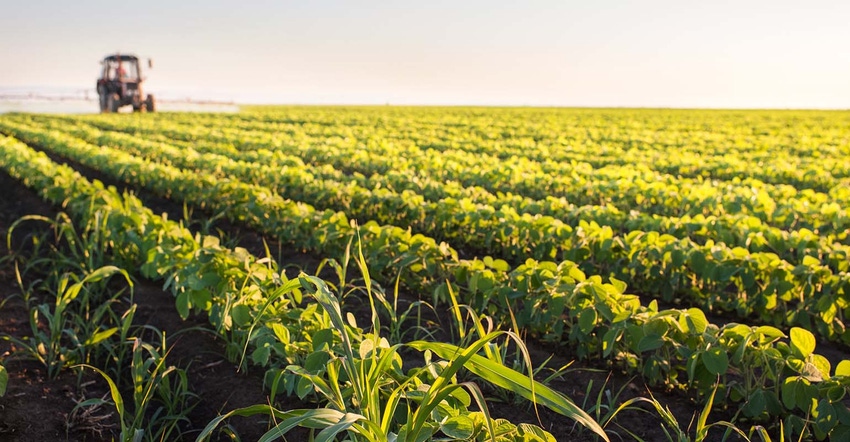
by Lydia Mulvany
Some Bayer AG investors were surprised to learn about the thousands of farmers lining up before U.S. courts to argue that Roundup -- the blockbuster weedkiller the German company recently acquired when it bought Monsanto Co. -- had given them cancer. But Roundup is hardly the only chemical in Monsanto’s portfolio carrying legal risks.
There are also lawsuits aplenty for dicamba, its next best-selling herbicide, which U.S. farmers are spraying on about 50 million acres of soybean and cotton crops this summer to combat weeds that have become resistant to Roundup.
Dicamba has a tendency to vaporize after being sprayed and drift onto neighboring fields, harming crops and other plants that aren’t genetically modified to withstand its effects. More than 1 million soybean acres are claimed to have been damaged this year as of mid-July, and last summer, that number was more than 3 million.
Monsanto and other crop-chemicals companies have come up with formulations that they say will stay put when applied correctly. St. Louis-based Monsanto pins the crop damage on incorrect application by farmers, and that’s going away with increased training. The company has received only a third of the complaints about off-target movement that it did last year, while acres have more than doubled, said Scott Partridge, vice president at Monsanto. Moreover, 12 states last year saw record soybean yields.
“Growers are exercising a choice, and they have chosen to purchase and plant and harvest the highest-yielding, most profitable soybeans that are out there,” Partridge said by phone. The technology “has a historic rate of adoption, and it’s one that’s desperately needed by soybean and cotton growers” to boost productivity.
Class-Action Suits
But some agricultural researchers and farmers say there’s still a problem, and dicamba continues to be a magnet for class-action lawsuits. These could cover thousands of plaintiffs, according to Tiffany Dowell Lashmet, an agricultural law specialist at Texas A&M University. Currently, 35 of 37 cases with 181 named plaintiffs have been consolidated into a federal class action, a number that’s far from being in the thousands, Monsanto said. Meanwhile, rival seed companies are piling on pressure: Beck’s Hybrids, the fourth-largest U.S. soybean-seed retailer, last month wrote to the EPA asking it to place new restrictions on the application of dicamba. Monsanto said its competitor could be looking to sell similar technology.
One lawsuit seeks to get dicamba taken off the market altogether. Oral arguments are scheduled for Aug. 29 in the U.S. Court of Appeals for the Ninth Circuit in Seattle over whether the U.S. Environmental Protection Agency broke the law in granting the herbicide a two-year registration, which expires in November.
Farmers using dicamba were supposed to avoid drift damage by following instructions written on an “unprecedented” and “byzantine” 16,000-word label, said George Kimbrell, the legal director at the Center for Food Safety, one of four non-profit groups bringing the suit. The EPA may also have violated the Endangered Species Act, Kimbrell said.
“After more than seven years of exhaustive scientific review and evaluation, EPA approved XtendiMax with VaporGrip Technology for in-crop use,” Bayer AG said in a statement. “Dicamba-based herbicides have a 50-year history of safe use, when applied according to label directions, and we are confident the government’s exhaustive assessment will prevail.”
‘Recurrent Theme’
Monsanto’s Partridge said that such lawsuits are a “recurrent theme” whenever the company brings new technology to the marketplace.
The EPA said it doesn’t comment on pending litigation.
“Our goal is to make a decision in time for growers to make informed seed purchase decisions for the next planting season,” the agency said in an emailed statement.
Bayer lost more than 13 billion euros in market value in the week ended Friday as news of Roundup-related lawsuits mount. On Aug. 10, a San Francisco jury awarded $289 million to a groundskeeper who said Roundup, a four-decade old herbicide based on a chemical called glyphosate, gave him cancer. Monsanto points to more than 800 studies indicating that glyphosate is not carcinogenic. Its parent company plans to appeal the verdict.
Bayer also recently failed to block the state of California from listing Roundup as a known carcinogen.
Partridge said the company’s dicamba-resistant soybeans had yields with a 5.7 bushel per acre advantage over a major competitor.
Dicamba is being sold to farmers for use in conjunction with the company’s Xtend GMO soybeans and cotton. For Bayer -- which completed its $66 billion acquisition of Monsanto in June and hasn’t yet integrated the companies -- the loss of Xtend would mean a hit of as much as $400 million to future earnings before interest, taxes, depreciation and amortization, Sanford C. Bernstein & Co. analyst Jonas Oxgaard said in an August research note.
Oxgaard also said in nearly all states that only followed the EPA’s regulations this year, drift complaints were higher. The EPA has to “balance farmers’ needs to manage glyphosate-resistant weeds with other farmers’ need to not have their crops destroyed,” he said.
“The likeliest outcome this year is for the EPA to give a one-year temporary registration, and impose even more stringent requirements,” Oxgaard said. “The likeliest outcome after that is for the registration to be revoked.”
If that happens, it would “derail Monsanto’s plans to roll out dicamba-tolerant seeds throughout the world -- the next step in herbicide tolerance -- and destroy a lot of value for new products Monsanto is launching over the next couple of years,” said Chris Perrella, an analyst at Bloomberg Intelligence.
--With assistance from Tiffany Stecker and Naomi Kresge.
To contact the reporter on this story: Lydia Mulvany in Chicago at [email protected]
To contact the editors responsible for this story: Simon Casey at [email protected] Millie Munshi
© 2018 Bloomberg L.P
About the Author(s)
You May Also Like




